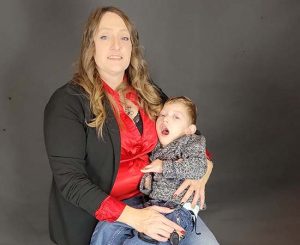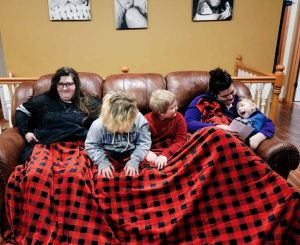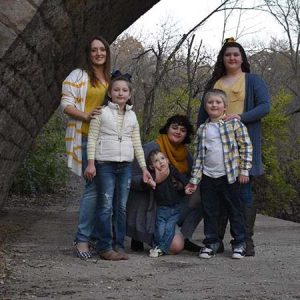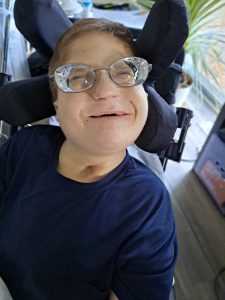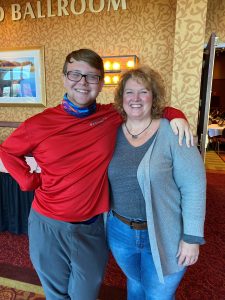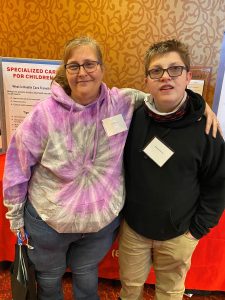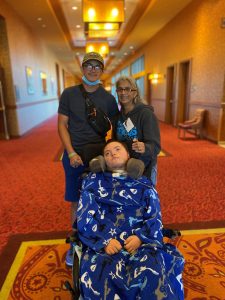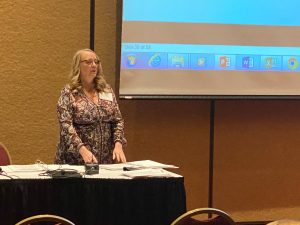Resources and Tips to Promote Good Mental Health
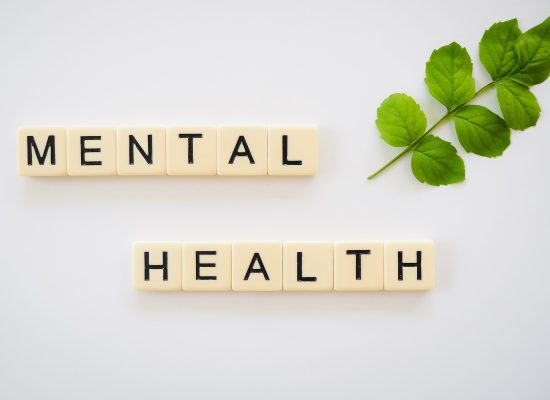
Helpful tools and resources for individuals of all ages in honor of Mental Health Awareness Month
May is Mental Health Awareness Month.
Society often focuses on physical health rather than mental health, but both are equally important. Mental health plays a big role in our overall well-being.
Although the pandemic’s challenges have led to more conversations about mental health, talking about it can still feel difficult or out of reach.
It’s important to remember that we all face challenges in life that can affect our mental well-being.
Understanding the topic can help us maintain good mental health and be more informed when experiencing a mental health condition or crisis.
Our Division of Specialized Care for Children (DSCC) team has pulled together a few resources to help get started:
- Life can be challenging, but every day shouldn’t feel hard or out of our control. A mental health screening at mhascreening.org can help provide a quick snapshot of our personal mental health. The screening is free and anonymous. The screening results can help start a conversation with your primary care provider.
- Our DSCC Transition Tools include a Mental Health Resources tip sheet with a helpful list of crisis hotlines, service locators, videos and more.
- Mental Health America’s (MHA) Back to Basics Toolkit, available in English and Spanish, covers a wide variety of topics and tools including stress management, coping skills, recognizing when help is needed and where to find help and support.
- The National Alliance on Mental Illness (NAMI) has resources geared toward kids, teens and young adults. NAMI also provides a coloring and activity book and step-by-step guidance to help parents explore and talk to children about emotional topics or mental health challenges.
- The Illinois Department of Public Health (IDPH) has developed a new “Youth, Adolescent and Young Adult Suicide Prevention” webpage. It aims to help family members and others prevent suicide by knowing the facts about suicide, who is at risk, warning signs specific to this age group and protective factors.
- The Caregiver Action Network provides a Blueprint for Families of Loved Ones with Mental Health Issues.
Remember the National Suicide Prevention Lifeline at (800) 273-8255 and the Crisis Text Line (text HOME to 741741) are available 24 hours a day, seven days a week.
A new, nationwide three-digit number will also be available this summer for people facing mental health crises. Starting on July 16, anyone in the United States can call 988 and get connected to the National Suicide Prevention Lifeline.
More mental health resources are available in our online Resource Directory. You can also follow our DSCC Facebook page for more reminders and tips throughout the rest of the month.
Knowing the basics about mental health will help us all feel better prepared when needed. Support is out there, and recovery is possible.
Affordable Connectivity Program Helps Lower Internet Costs
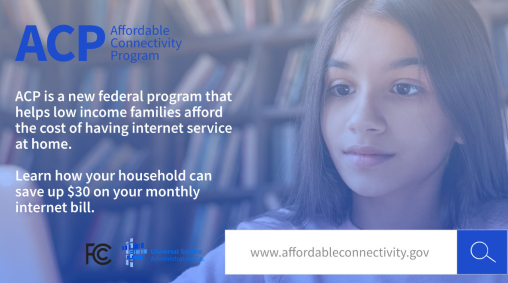
Eligible families can receive discounts on internet service and devices in their homes
Having affordable and reliable internet service at home is more important than ever.
The Affordable Connectivity Program (ACP) is a federal program to help families afford the cost of internet service and devices in their homes.
Households can qualify in a number of ways. Eligibility can be based on income, participation in other assistance programs or if anyone in the household already receives a Lifeline benefit.
Under the ACP program, eligible households may receive:
- Up to $30 per month discount for broadband service
- Up to $75 per month discount for households on qualifying tribal lands
- A one-time discount of up to $100 for a laptop, desktop computer or tablet purchased through a participating provider. The household must contribute more than $10 but less than $50 toward the purchase price.
The ACP is a program of the Federal Communications Commission (FCC).
The program is limited to one monthly service discount and one device discount per household.
To apply, go to ACPBenefit.org. You may submit your application online or print a mail-in application in English or Spanish.
Applicants also must contact their existing or preferred provider to select a plan and have the discount applied to their bill.
For complete details and to access American Sign Language videos about the program, visit www.fcc.gov/acp.
The ACP Support Center is also available to answer your questions daily from 8 a.m. to 8 p.m. at (877) 384-2575 or ACPSupport@usac.org.
For more utility and financial assistance programs, visit our online Resource Directory.
Summer Camp Fun for All Ages and Abilities

Here’s a list of day, overnight and virtual camps to help you find the right fit for your child
It’s hard to believe another school year will soon come to an end.
The good news is there are a variety of opportunities to help your children stay engaged and continue learning during the summer break.
We’ve compiled a list of virtual, day and overnight camps across Illinois for all ages.
Does your child want to make new friends? Develop new skills? Meet others with their condition or foster their independence?
Our 2022 summer camp list can help you find an opportunity that is the right fit.
Many camps are returning to in-person sessions this summer. Virtual camp opportunities are also available.
All these camps are accessible for a variety of special needs and abilities, including many of our program’s eligible medical conditions.
Our events calendar shows the summer camps listed by date. You may also search for events in your area by clicking on a regional office near you.
Know of an in-person or virtual summer camp opportunity to add to our list?
Send us the details at dscc@uic.edu. We’ll continue to update our list of camps and activities, so please check back often.
DSCC Intern Grateful for Education Opportunity of a Lifetime
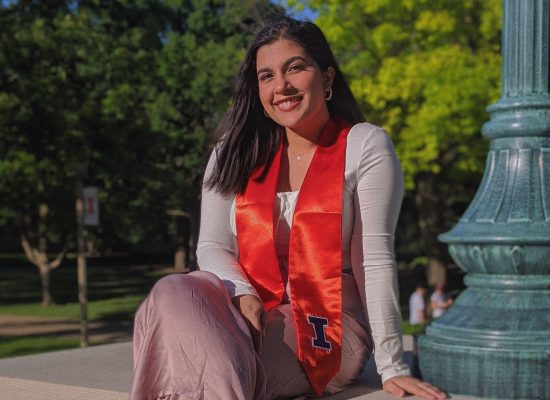
“My time with DSCC has not only shaped me as a social worker but also shaped my idea of the perfect team.”
As part of the University of Illinois Chicago, the Division of Specialized Care for Children (DSCC) offers internships and other valuable educational opportunities to college students. These opportunities help students gain real-world experience and complete their advanced degrees.
They also help develop the next generation of social workers, nurses and health care providers to serve children and families with understanding and compassion.
To celebrate Social Work Month, we’re sharing how a DSCC internship provided life-changing experiences for one young social worker.
“My time with DSCC has not only shaped me as a social worker but also shaped my idea of the perfect team,” said Sruthi Thinakkal.
Sruthi wrapped up her two-semester internship with our Marion and Olney Regional Offices in December 2021. She recently graduated with her master’s degree in social work through the BHWELL Scholars Program at the University of Illinois at Urbana-Champaign.
Drawn to partner, help and connect
Sruthi said she discovered DSCC through her advisor. When she first began looking for internships, she was struggling to find the right fit.
About a month before she had to make her decision, Sruthi’s advisor mentioned a new internship opportunity with DSCC that recently opened.
Sruthi did her research and liked DSCC’s mission and approach to helping families. She decided to apply.
“The emphasis was on partnering with families and communities to help children and youth with special healthcare needs connect to services and resources,” she said. “Also, that children and youth with special healthcare needs should be at the center of a seamless support system really stuck with me.”
When Marion and Olney Regional Manager Amy Jones reached out to Sruthi, the “deal was sealed.”
“She spoke passionately about providing families support and teaching them the skills needed for success. Her enthusiasm and sincerity were contagious,” Sruthi said.
She felt excited but worried she would miss out on important opportunities because of the pandemic and working remotely.
Sruthi soon learned she was “in a really good place” and that remote work would be smooth and successful.
“A true team approach”
“From the beginning, the Olney and Marion regional offices provided me with information, cheat sheets, everything I needed to get situated. They would reach out in so many ways,” Sruthi said. “We used chat and had weekly meetings to bond and catch up. It was AMAZING, a true team approach.“
Sruthi shadowed DSCC Care Coordinators during their comprehensive assessments and person-centered planning conversations with families. She also helped Care Coordinators with data entry, scheduling and making calls to families.
One of Sruthi’s major accomplishments during her internship was a guardianship project for DSCC families and staff members in southern Illinois.
Sruthi created an extensive, easy-to-click-through tool kit that includes definitions for the various guardianship processes, step-by-step instructions, courthouse contacts, blank copies of needed forms and legal resources. She presented the toolkit to a group of more than 50 DSCC staff members in the southern region of Illinois.
“Sruthi’s project focused on (the question), could families complete this type of process on their own?” Amy said. “She diligently contacted all 32 courthouses in both regions, put together a comprehensive tool kit, then partnered with Care Coordinators to make calls and contact families. Already, one family she helped has successfully completed the process and another continues to work through the process.”
Amy praised Sruthi’s eagerness to learn and ability to soak up information.
Lessons for a lifetime
The end of the internship was bittersweet for both Sruthi and the Marion and Olney office teams.
“It’s hard leaving a fantastic team but the lessons I’ve learned will be with me always,” Sruthi said.
“One of the biggest takeaways for me is the importance of just being there and listening. Chatting about every aspect of a kiddo, providing space to vent, helping to arrange something for a family that has so much going on every moment and obstacles no one expected, getting to know parents who are so worried about their kiddos that they forget about their own health, and hearing how they feel alone, not lonely,” she continued.
“These conversations with families each month create an everlasting relationship and lessons that I will carry with me for a lifetime.”
Sruthi is now moving to Chicago and launching her career in social work. She’s ready to take what she’s learned at DSCC and put it into action.
“I’m so grateful for my internship at DSCC,” she said.
“I will be working with the Rush Craniofacial Center team and believe that my internship experience at DSCC was key to helping me move into this position. I’m looking forward to building new partnerships, connecting individuals to the programs and tools needed for self-determination, and making sure that each patient knows that they have a team behind them that genuinely cares.”
DSCC Participant’s ‘Baby Bucket List’ Spreads Awareness and Joy
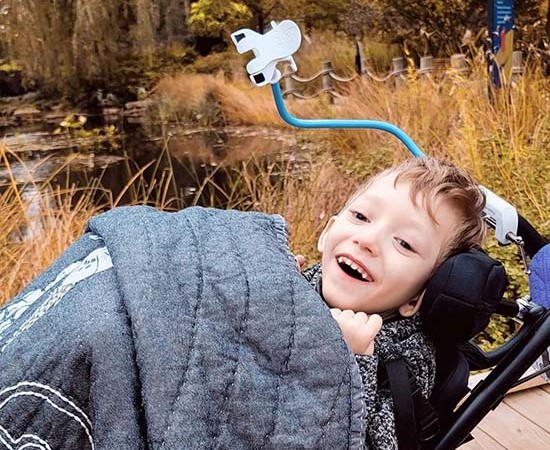
Elijah’s Baby Bucket List is a social media movement raising awareness about lissencephaly while helping 4-year-old Elijah live life to the fullest
Elijah is quite the celebrity and not just among his nine older siblings.
The 4-year-old was born with a rare, terminal genetic condition called lissencephaly.
The devastating diagnosis led his family to create a bucket list to fill Elijah’s lifetime with as much happiness and adventure as possible.
“Elijah’s Baby Bucket List” is now a popular social media movement dedicated to raising awareness about lissencephaly. It also provides opportunities for Elijah to live life to the fullest while spreading joy and making new friends and memories.
Elijah’s story has appeared on TV, in print and online. He also has thousands of followers from around the globe on platforms including Facebook, Instagram, YouTube and TikTok. His followers read about his latest experiences and enjoy videos of his infectious laughter and smile.
“He’s always happy, always laughing. It’s hard to stay sad when he’s around,” said his mother, Amy Tarpein. “He is unconditional love and the embodiment of pure joy.”
“Choose joy”
Elijah, a participant with the University of Illinois Chicago’s Division of Specialized Care for Children (DSCC), was born deaf. Approximately two months later, he was diagnosed with lissencephaly.
Lissencephaly occurs when the folds and grooves of the brain do not develop correctly.
“It was devastating. The doctors said he wouldn’t live beyond the age of 2,” Amy recalled. “We were packed and ready to spend time at my sister’s. Instead, I loaded up the kids, left the hospital and we drove to Florida to see the ocean.”
During that trip, the idea for Elijah’s Baby Bucket List was born.
“It can all be really hard, but we decided that we could either sit around and feel sorry about things or choose to give Elijah the best, God-filled life possible while he’s here. We decided to choose joy, be grateful, encourage others and hope,” Amy said.
Through “Elijah’s Baby Bucket List”, the family shares inspirational messages, videos and updates as they work through experiences on Elijah’s bucket list.
“We’ve shared about the first time he heard his sister sing, visits to the hospital and doctors, and our adventures to the Morton Arboretum, Beyond Van Gogh Exhibit, St. Louis Aquarium, hiking in the mountains, observing stars with a NASA scientist, picking pumpkins, playing in the leaves and a private screening of ‘Clifford the Big Red Dog,’” Amy said.
“The focus is on Elijah doing or watching the things on the list and making as many memories and friends as possible!”
Other recent highlights include the city of Quincy declaring Sept. 8 as Lissencephaly Awareness Day and lighting the Bayview Bridge purple in his honor. The Quincy Herald-Whig newspaper covered the special honor and Elijah’s story last fall.
“Our town came together to spread awareness and advocate for kids who are differently-abled. They lit up the bridge purple for Elijah, ” Amy said. “I can’t express the emotion that overwhelmed me when we were also given a beautiful photo of the purple bridge taken by a local artist. The community support for my family has been amazing.”
“Be a light”
Amy says her family loves Elijah fiercely. He has five grown siblings and four at home — Avayha, Isaiah, Kaylynn and Mackenzie – who dote on him.
They enjoy spending time together reading, studying, looking at and doing art, listening to music and cuddling.
“Avayha practices violin with him. She tells him the strings and what she’s playing. He loves music,” said Amy. “When we go to museums, she will read all of the descriptions and tell him about the exhibits and artwork.”
Elijah’s lessons include learning sign language and using his computer with an eye gaze device.
“He’s doing stuff they said he would never do,” Amy said. “He’s gotten really good at matching his letters, numbers, colors and shapes. He signs mom, dad, call, dog, no and will also sign ‘all done’ when he doesn’t want to get into his AFOs, the orthotics braces, because they are uncomfortable.”
Elijah’s sister Avayha wants to take him to Paris to drink lemonade and see the museums. She set up a lemonade stand to fund the trip, but the COVID-19 pandemic soon followed.
“Avayha asked if she could learn web design, so she could build up her own site,” Amy said proudly. “At 9-years-old, she studied and set everything up on her own. She’s determined to take him.”
Avayha’s website is Lemonade in Paris.
Amy calls caring for Elijah life-changing in the best possible ways.
“If someone had told me that five years ago, I would not have believed it. This was not the plan, but I love my life,” she said.
More to Explore
DSCC has worked with Elijah’s family since 2019. As Elijah continues to check off items from his baby bucket list, DSCC continues to help support his family’s journey.
“DSCC collaborates with a wide range of agencies,” said Elijah’s Care Coordinator Kathy Thomas. “We’re here to listen and help families with children with complex health needs navigate insurance, health care and other resources.”
DSCC’s Care Coordinators work countless hours helping families set and achieve their child’s goals based on their family’s unique needs.
Amy continues to plan new adventures for Elijah, stay positive and share the positivity with others.
“Elijah continues to defy the odds,” she said.
“Some things can’t be fixed, only carried! Life is full of things you can’t fix, no matter how well-intentioned you are. God, your higher power or whatever you believe in, always sends someone. I can’t explain half the stuff that happens in our lives, but we are braver together. This was not my plan, but I am truly blessed to be his momma.”
To learn more about Elijah and lissencephaly, follow Elijah’s Baby Bucket List on Facebook or visit elijahsbabybucketlist.com.
Illinois Miss Amazing Program Accepting Applications
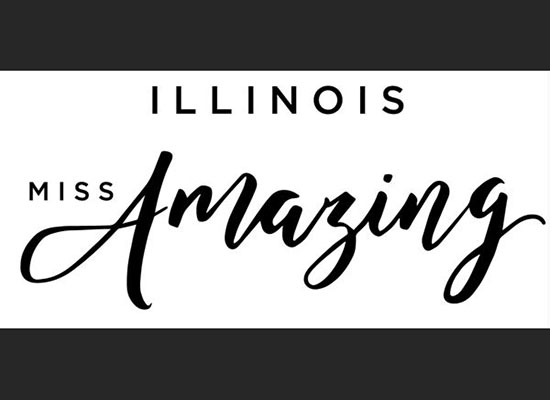
The program provides a nurturing, empowering experience for girls and women with disabilities
Illinois Miss Amazing is accepting applications for its 2022 program.
Miss Amazing is a national nonprofit program for girls and women with disabilities. The program aims to build self-confidence and vital self-advocacy skills for participants as well as nurture a sisterhood of girls and women from different walks of life.
According to the Miss Amazing website, girls and women with disabilities face a unique set of economic, social and political challenges. The Miss Amazing program seeks to encourage future leaders and break down stereotypes by empowering girls with disabilities from a young age to take pride in who they are, to set ambitious goals and to fight for the respect that they deserve.
Miss Amazing is open to girls and women ages 5 and older who have:
- An Individualized Education Program (IEP) or Individualized Program Plan (IPP)
- A 504 Plan
- Supplemental Security Income (SSI)
- A physician’s records proving disability
Illinois Miss Amazing is accepting applications for participants and volunteers for its annual Amplify event on April 9 at the Yellow Box in Naperville. The application deadline is March 1.
The Illinois Miss Amazing experience includes:
- Show rehearsal
- Interviewing
- A fun evening wear presentation
- Sharing your passion and creativity on-stage
- Building friendships
This year’s event is in-person and will feature two shows and one big celebration.
Learn more about the Illinois Miss Amazing program and how it helped one of our participants spread her wings on stage and off at https://dscc.uic.edu/dscc-participant-promotes-illinois-miss-amazing/.
Inspire someone you know to participate in Illinois Miss Amazing.
Applications will be accepted until March 1 or as soon as all spots are filled.
Program Coordinator Assistant Earns DSCC’s 2021 Merit Award
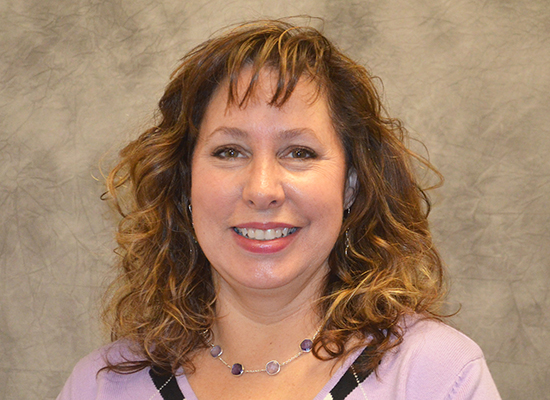
Kimberley Firkins recognized for exemplifying DSCC’s mission to partner, help and connect
Kimberley Firkins is the 2021 recipient of the Award of Merit from the University of Illinois Chicago’s Division of Specialized Care for Children (DSCC).
The award recognizes exceptional employees for outstanding dedication and service to Illinois children with special healthcare needs.
Kimberley, also known as “Kim” or “Kimba“ to co-workers, is a Program Coordinator Assistant for Home Care Region 2. She is based in the Lombard Regional Office.
Program Coordinator Assistants work as a team with Care Coordinators to meet our participant families’ needs.
Kimberley is a team player and a constant source of encouragement and support for her participant families and co-workers alike.
Her colleagues say she is friendly, welcoming and gladly offers her creativity, knowledge and skills to assist wherever needed.
She sends her Lombard teammates positive messages and self-care tips weekly to keep everyone motivated and foster a positive work environment. Those messages have helped bridge the “disconnect” of working remotely through the pandemic.
Co-workers say her calm and caring nature puts the families she works with at ease.
“Kimberley’s enthusiasm and passion for serving others are an inspiration to many,” said DSCC Executive Director Thomas Jerkovitz. “The past two years have been challenging. Kimberley’s teamwork spirit highlights that the way we are working may be different, but our dedication to each other and our participant families remains strong.”
Kimberley has worked at DSCC for 16 years in the Core and Home Care programs.
“I would like to say how fortunate I am to work in an organization that makes such a huge impact to so many people and families, especially over the last almost two years,” Kimberley said.
“I hear from families almost every day how important it is for them to hear from their care coordination team not just as their Care Coordinators or the Care Coordinators’ Assistants but as their friends as well, wanting to know how they’re doing, how things are going, and how they’re handling all of the stressors that are happening right now. It just means so much to me to know that our organization has that place in their family.”
Kimberley was an Award of Merit nominee in 2016, 2018, 2019 and 2020. She said she is both honored and surprised to receive the 2021 award.
“I am so very grateful. It means the world to me, but I don’t do what I do without everyone else. We’re all one team. We all won this,” she said.
DSCC staff nominated a total of six of their colleagues for this year’s Award of Merit. As the winner, Firkins receives an Award of Merit memento, a $2,500 award and recognition from the Executive Director.
The other 2021 nominees are:
- Cynthia Booth, Home Care Program Hospital Liaison, Chicago Home Care Regional Office
- Becca Hunt, Care Coordinator, Marion Regional Office
- Danielle Osburn, Claims Unit Assistant Supervisor, Central Administrative Office
- Tess Rhodes, Quality Improvement Specialist with Core Quality Improvement, Central Administrative Office
- Marian Walles, Care Coordinator, Mokena Regional Office
Congratulations, Kimberley! And a big thank you to all the nominees for their excellence on behalf of our children and families!
Santa Making Sensory-Friendly Stops Statewide

Free Santa visits for children with autism and other special needs
Are you ready for some Santa magic?
Autism Speaks has partnered with Cherry Hill Programs to provide sensory-friendly Santa experiences nationwide.
In Illinois, Santa will be spreading joy and holiday cheer on Dec. 5 and 12.
Join Santa in a calmer, more subdued environment. He is planning stops in communities that include:
- Aurora
- Champaign
- Chicago
- Gurnee
- Moline
- Northbrook
- Orland Park
- Peoria
- Rockford
- Rosemont
- Schaumburg
- Springfield
- Vernon Hills
These sensory-friendly Santa experiences are free. Keepsake photo packages are available to buy.
You can reserve your spot for the Santa experience online. (The organizers strongly encourage reservations.)
For more upcoming holiday events for children with special healthcare needs in Illinois, be sure to check our Special Events page often.
Transition Conference Prepares Youth With Disabilities for Adulthood
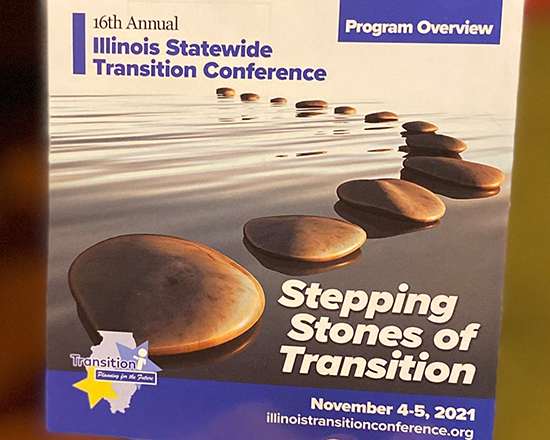
Families and professionals came together in person and virtually at the annual Stepping Stones of Transition Conference in East Peoria to improve outcomes for transition-age youth with special needs
As a single parent raising a child with complex medical needs, Kristen Fisher says it’s easy to feel isolated.
The feeling subsided as she walked through the East Peoria Riverfront Conference Center and saw dozens of other parents and youth with similar needs.
“Seeing everyone at the conference and meeting other parents, it helps confirm that I’m not alone,” Kristen said.
The Illinois Statewide Transition Conference, titled “Stepping Stones of Transition,” returned for its 16th year on Nov. 4-5 in East Peoria after a one-year absence due to the COVID-19 pandemic.
More than 660 families and professionals gathered in-person and virtually to gain skills, resources and information to help youth with disabilities prepare for adulthood.
The University of Illinois Chicago’s Division of Specialized Care for Children (DSCC) is a conference sponsor and served on its steering committee.
DSCC covered the conference-related expenses for 33 of our participant family members across the state.
A “Phenomenal” Experience
Kristen is the mother of DSCC participant Connor Fisher, who will soon turn 15 years old. He was born prematurely with profound delays and a “smile that will melt your heart,” she said.
This year’s conference was Kristen’s first and she called the experience “phenomenal.”
“It’s hard to grasp that my baby is not a baby. He’s growing up. It’s a scary transition,” she said.
Kristen particularly enjoyed the breakout session “SSI, SSDI, HFS: Understanding the Alphabet Soup of Government Benefits.” She gained a better understanding of available government benefits and how they change over the lifetime.
DSCC mom Amy also learned helpful information during the breakout session on government benefits. She said financial planning is an important part of preparing for her daughter Jaida’s future. Jaida, 17, has been a DSCC participant since just after birth.
Eighteen-year-old DSCC participant RJ Smith attended the conference with his mom, Karla. It was the first time attending for both.
RJ is a senior in high school who plays the baritone in his high school band. He wants to go to culinary school after graduation to become a baker.
He picked all the conference breakout sessions that he and Karla attended.
One of their favorites was about the Fast Track Transition Program through the Illinois Department of Human Services’ Division of Rehabilitation Services. The program provides pre-employment transition services to students with disabilities.
RJ said he is ready for more independence, and Karla said the session helped open her eyes to more options to help achieve that.
“I want to help him become more independent and push him toward that but not just leave him sitting the middle of the road, stranded,” Karla said. “(The conference) overall has been helpful.”
Preparing for Life After Graduation
The conference consisted of informative breakout sessions in the areas of:
- Employment
- Education
- Community
- Health Care
DSCC participant Michael Rounds, 15, said he enjoyed the breakout session on the Culture of Coordinated Support Model. This model is where people with disabilities, families, supporters, agencies and service providers work together to develop and implement consistent support plans with unified goals and services provided by the provider best suited to do so.
Michael said the session made him think about getting more involved with his Individualized Education Program (IEP) at school. He also liked learning more about what choices are available to him as he plans for his future.
His mother, Lori, said the conference helped her know where to start in preparing Michael for life after high school graduation.
Rosa Menard, mom to 17-year-old DSCC participant Jacob, said the amount of information to soak up over the two-day conference was almost overwhelming. She took many notes about potential resources and programs to discuss during Jacob’s next IEP meeting.
Jacob is non-verbal and she wants to set him up for success after high school.
Rosa encouraged other families to start the transition planning process as soon as possible.
“Start asking those questions now,” she said.
Improving Outcomes
Nearly 40 DSCC staff members attended the conference in-person or virtually to network, learn from others and strengthen their skillsets and tools to serve our families.
DSCC also sponsored the conference’s health care track for providers who play a role in the transition from the pediatric to adult healthcare system and those who build youth’s capacity and healthcare skills to prepare for adulthood.
DSCC Transition Specialist Darcy Contri said attending providers found helpful tips and information they will apply in their own practices and interactions with youth and families. These changes include:
- Starting the transition planning process sooner with patients and families
- Making sure the youth and their family are included in all decision-making and planning
- Keeping a holistic view of the patient and noting environmental barriers for their family
- Emphasizing self-determination when working with youth and families on transition goals
- Discussion of self-management strategies with youth and families
Darcy has been involved with planning the conference for the last 16 years.
“Every year it has been exciting to see the positive impact the transition conference has on improving outcomes for Illinois transition-age youth and their families,” she said.
Visit our Facebook page to see more photos from this year’s conference.
New Monthly Mama Therapy Group for Central Illinois Caregivers
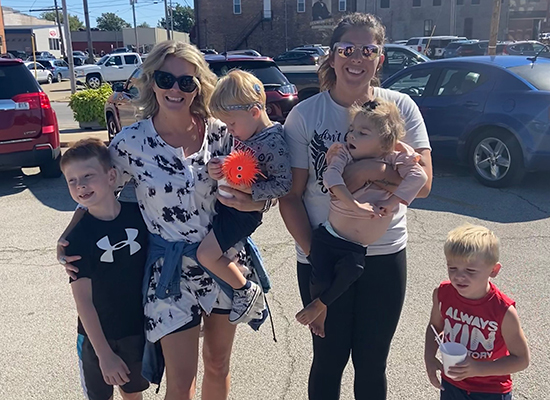
A DSCC mom and her friend started the Facebook group to connect with other parents of children with special needs
Thanks to an outing at a coffee shop, hearing aids and an impromptu conversation, two moms with children of similar ages and needs connected.
“I saw her daughter’s hearing aids. My son has them, too, so I just started talking to her,” Lace Mandrell said of her first meeting with Bailey McBurney Imig.
In no time Lace and Bailey were texting, talking and sharing tips, concerns and road trips to specialists.
Their immediate connection led to a new Facebook group called “Monthly Mama Therapy.”
Monthly Mama Therapy aims to help central Illinois caregivers of children with special needs connect with and support one another.
“If you’re trying to understand a diagnosis or therapy, running from appointment to appointment or saving for the next piece of equipment, things can be challenging,” said Lace “We just thought that having a network of moms with a wide range of experiences, ready to back you up on the good days and the bad days, would be amazing.”
Lace is the mother of two sons, Ollie and Auggie. Auggie, 3, is bilaterally deaf and has had cochlear implant surgery. He also has Chiari Malformation and was diagnosed with Waardenburg Syndrome.
“He’s a wild child who rarely stops moving,” Lace said. “He’s sweet, inquisitive and a little sponge excited about learning and soaking up everything around him.”
Auggie is a participant in the University of Illinois Chicago’s Division of Specialized Care for Children (DSCC). He has been enrolled with DSCC since 2019.
Bailey McBurney Imig is also the mother of two: Paxton, 3, and Parker, 2 1/2. Parker is deaf and has undergone multiple screenings and tests. There is still no diagnosis for her other conditions.
“With all of the testing and so few answers, I feel like she’s probably that one in a million child who will have a diagnosis named after her,” Bailey said. “But, despite all her complications, Parker is a tiny, little bundle of joy who loves attention. She’s an easy-going cuddler who is almost always happy and smiling.”
During their first meeting, Lace and Bailey related to each other right away.
“We just hit it off and I’m so glad. With HIPAA (the Health Insurance Portability and Accountability Act) and concerns for privacy, it can make it hard to connect. Then COVID-19, online therapies and everything else got thrown in,” said Lace. “It’s hard to do this stuff alone. It can get really complicated and overwhelming.”
The more Bailey and Lace talked, the more they wanted other moms in the “same or similar boat” to have a safe space where their kids could connect and they could relax, share and recharge. The seed for Monthly Mama Therapy was planted.
Monthly Mama Therapy has a private Facebook page and hosts meet-ups at local parks, coffee shops and other venues in the Champaign and Bloomington areas. Conversations online and in-person may range from accessible parks and walking trails to experiences with therapies or the transition to school.
The group promotes “therapy” and the importance of caregivers taking care of their own needs, too.
“The online community is really growing. When someone asks a question, the support and responses have been great,” said Bailey. “Our ultimate goal is to build an in-person community that’s just as strong.”
Monthly Mama Therapy hopes to continue growing online and meeting in person when the weather turns cool at central Illinois locations where distancing is possible.
“Our wish list includes adding some veteran parents who are willing the help the ‘newbies’ navigate and prepare for the transitions ahead,” said Lace. “We’d also love to add activities like exercise or yoga to do together.”
For more information, visit the Monthly Mama Therapy Facebook page.



